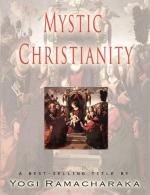And this was but the beginning. During the next eight hours He was subjected to six separate trials, if indeed such mock proceedings might be so designated. Subjected to blows, and all manner of low insults, the Master remained a Master. Perjured witnesses testified, and all manner of crimes and heresies were charged against Him. Then Caiaphas asked Him the all-important question, “Art thou the Christ?” and Jesus broke His silence to answer positively, “I am!” Then the High-priest cried out vehemently, rending His sacred robes in his pious indignation, “He has blasphemed!”
From that moment there was no possible chance of escape for the Master. He had virtually condemned Himself by His own words. There was no retreat or reprieve. He was roughly pushed from the hall and like a common criminal was turned over to the taunts and revilings of the mob, which availed itself of its privileges to the full in this case. Insults, curses, revilings, taunts, and even blows, came fast and furiously upon Him. But He stood it all without a murmur. Already His thoughts had left earthly things behind, and dwelt on planes of being far above the wildest dreams of men. With His mind firmly fixed on the Real, the Unreal vanished from His consciousness.
In the early part of the day following the night of His arrest, Jesus was taken before Pontius Pilate, the Roman official, for His trial by the civil authorities. Pilate, in his heart, was not disposed to condemn Jesus, for he believed that the whole trouble consisted in theological and ecclesiastical differences with which the civil law should not concern itself. His wife had warned him against becoming involved in the dispute, for she had a secret sympathy for the Master, for some reason. But he found arrayed against him the solid influence of the Jewish priesthood, whose power must not be opposed lightly, according to the policy of Rome. Then the priests had made out a civil case against Jesus, claiming that He had sought to incite a rebellion and proclaim Himself King of the Jews; that He had created public disorder; that He had urged the people to refuse to pay taxes to Rome. The case against Him was weak, and Pilate was at a loss what to do. Then some one of the priests suggested that as Jesus was a Galilean, He be turned over for trial to Herod, in whose territory the principal crimes were committed, and Pilate gladly availed himself of this technical excuse to rid himself of responsibility in the matter. And so the case was transferred to Herod, who happened to be in Jerusalem at that time on a visit. To Herod’s palace the captive was taken, and after suffering indignities and humiliation at the hand of the tyrant, He was remanded back to Pilate for trial, under Herod’s orders.




